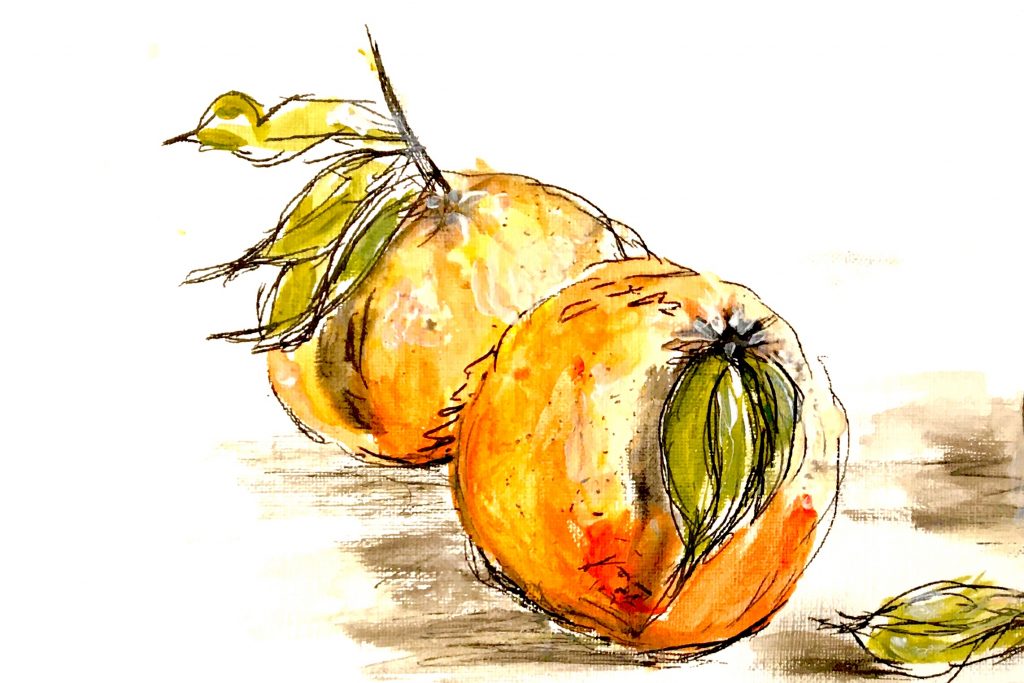I let Damian do his project on serial killers in Iowa. This seemed like a bad idea, which was the point. It was early March, end of school year in sight, and Damian had been having bad ideas since August, when we wrote about imagining what we’d be doing a year from now. His answer was ‘Selling oranges by the side of the road.’
In classroom discussions, he liked to tell his friends, ‘You’re stupid.’ He also liked to seize on incidental use of words such as ‘roll’ or ‘ingest’ as opportunities to intimate his recreational use of marijuana, by snickering.
The oranges scenario I kept to myself for personal worrying. Low self-esteem of that magnitude can’t just be pep-talked away. What to do, though? Hmmm. I wanted to think of Damian as someone other than the unfunny class clown, the saddest clown of all. When I asked him after class about un-positive contributions to our learning environment, he would apologize with flagrant insincerity, looking like a big bad wolf who intended fully to blow down another house as soon as our little talk was over. He had the wolf’s wet grin and overzealous gleam, as if he knew the brick house and boiling kettle awaited so he had better get his damage done now, yet also knew his story would be told in perpetuity and therefore he would always return to power.
The thing to do when your students start reminding you of fairy tale villains is call home, yet I never did because amongst my flaws as a high school English teacher is assuming that the kids who irritate me the most cannot possibly have a competent parent, or else why would they be behaving so badly.
Furthermore, school has an institutional bias against badness which I personally resent. The rules and rhetoric all postulate a world of unrelenting goodness which relegates badness to places of shame instead of recognizing its status as an essential element of human nature. Yet report cards and attendance awards and pep talks do not ensure goodness among students, or faculty for that matter.
For example, not all of my own ideas are splendid. Oh, not hardly. There is one bright, talented girl in period six who shakes her head vehemently to indicate no-no-no whenever I draw near. She is a sober individual with several college scholarships awaiting. The simple fact, which you could get right or wrong on a test, is: my way is not hers.
Yet still I approach the bright, talented, not amused girl. I am not a giver-upper. Maybe this time is the time the well-meaning gesture will be accepted. She will not leave the gold star on her desk, crumpled like a wounded starfish. __ Maybe. __ Don’t count on it. __ But still: if you’re a teacher and you’ve given up, it’s time to heed another calling.
I have not given up. Just the opposite. I am the right amount of zealous in the interpretation of problems as opportunities. For example, I view the girl who shakes her head no as a reminder of my need to connect with people more straightforwardly.
Damian, who wanted to do his project on serial killers of Iowa, has the exact same problem – or else the opposite problem, of being too straightforward. My inability to get a read on him was obvious from Day One, in August, when we were illustrating words that called to us from poems that spoke to us. I had borrowed umpteen poetry collections from the downtown library: beatbox poets, Sufi poets; poetry of all the lands and peoples. The surefire, can’t-fail, perfect first day lesson goes like this:
1) Find a poem that speaks to you,
2) Identify a word that’s calling,
3) Write and illustrate the word big and bold,
4) Include enough lines for context,
5) Give the meaning, and
6) Explain why you chose it or it chose you.
Craving, defiant, indelicate, lamentation, cosmic, queer, impenetrable, nameless, illuminated, immense, destiny, adamant, millenium and essence were among our words.
Damian’s word was ‘Fuck You.’
He ran it by me, first, supposedly wanting to make sure it was okay. In a sense, it was him being, ha-hah, watch me say f-u to the teacher and get away with it; in another sense, it was me thinking, ah-hah, here’s a young soul to work with from the get-go. So I told him, sure, go ahead. But after some uncharacteristic after-thought, I posted all the kids’ words from all of my classes except for Damian’s f-u, simply because I didn’t feel like looking at it all day long. If he wants to get his work posted, let him come up with and follow through on something more original.
Yet even though we began each class with compliments and good news to get a good vibe started before I make kids put their phones away, Damian continually lobbed crude insults at his pals – that’s stupid, you’re ugly – in a braying, I-hate-myself tone that further challenged my motivation to somehow try to build this kid up within my jurisdiction of reading, writing, listening, speaking and the fuzzy zone of ‘being nice to people’.
Despite all of my pedagogic derring-do, however, Damian remained committed to his flinching, cringing, meant-to-be but not-funny, instead maddeningly irritating mode of discourse. This is not to say he wasn’t bright. One time when we were discussing literary elements he asked whether a phrase could combine consonance, assonance and parallel structure.
‘Sounds poetic,’ I ventured, attempting not to hope this was The Breakthrough. ‘Do you have an example?’
‘Yes I do,’ he announced with the stagey aplomb of a seasoned talk show guest. ‘Poison semen.’
‘Bingo,’ I said, using breeziness to disguise my feeling that Damian was a kid needing more help than I had to offer.
∆
Iowa turns out to be fertile soil for serial killers. We were studying it to figure out how this swing state voted for Trump in the 2016 election. Before you seek to be understood, seek first to understand, and things of that nature. John Wayne Gacy and Jeffrey Dahmer both lived for significant stretches in Iowa. I really did not want to know any of the factoids Damian was promptly uncovering, such as that Dahmer’s father possessed an advanced degree in chemistry.
All that schooling and look what happened.
Yet, on the plus side, while researching Iowan serial killers Damian was engaged and productive, which I could tell because he was writing things down in a remarkably clear handwriting that looked like it was continually turning cartwheels.
Also, I had a new theory. The presumably feigned interest in serial killers and all the negativity in general was a cover-up for the lovingkindness Damian felt deep down but feared ridicule for exposing. Somebody must have made him uneasy about showing kindness, which is sad. He had it in him, but where? If you can’t find it in the light, you have to look in the dark.
If I only could endure this exposure of serial murderers’ biographical material. They weren’t always and exclusively killing people. That came After. There has to be a Before when they do the same stuff as other people. Have a busy father. Have a missing mother. Go to school. Get in fights. The more Damian excavated about serial killers’ distinctive ghastliness, the more widely opportunities would emerge for him to express his own authentic gentleness.
This was the theory.
Well, as I said, it was a bad idea. The more Damian uncovered about Iowan serial killers, the more he smiled – not a healthy, prime-of-youth smile, but rather a hang-dog simper. This I could not endure, so one day while all the other teens were working on their Iowa agriculture, Iowa music, Iowa fashion, Iowa food, Iowa maps, Iowa monuments, and Iowa memes exhibits, I called Damian to my desk for a sober assessment.
‘How are you doing?’ I asked, feeling proud of my desk. Earlier that day I had cleared it off so now there was room for his elbows should he decide to make himself at home.
‘I’m doing Wunderbar,’ Damian stated with patently false glee, pronouncing the W as a V and elongating the r beyond endurance. I listened with my liver, which told me that the glistening in his great big eyes predicated shame.
‘Glad to hear it,’ I replied, feeling my words mean their opposites, and also feeling us about to plummet as though we had arrived at the apex of a badly maintained amusement park free-fall. To fend off panic, I got to the point.
‘Stop working on serial killers,’ I told Damian. ‘Work with Mathilda on fashion.’ That was it. No little jokes. No hoo-ha. Just me telling him what to do.
His gleam abated yet still remained alarming, decreasing only from about 180 to 140 percent of what I would consider roughly normal.
‘Yes, sir,’ he said. Did I detect a note of sincerity? Within that note, was there a quaver of gratitude for being set on the proper path?
Mathilda is a powerful figure in our classroom, preternaturally composed yet adolescently buoyant. Both of her parents are pediatricians and they raised a healthy child. Mathilda emanates bodily well-being. This newly decreed partnership between her and Damian would be a peer-to-peer intervention for the ages. Come witness the healing power of peer-to-peer intervention, I beckoned the misty legions of imaginary teachers whom I want to impress with my smoothness.
Sure enough, Damian and Mathilda were soon huddled together, elbow to elbow. I toured the room murmuring approval, bestowing big checkmarks. When the bell rang, everyone turned in their work so it wouldn’t evaporate into the papersphere – except not the normally clockwork Mathilda and her new sidekick Damian.
‘Let’s see what you got,’ I insisted, bursting with pedagogic swagger based on two factoids gleaned with a glance at another kid’s map of Iowa lakes and rivers. Iowa has 132 lakes and 25 rivers. This was something at least one of my students demonstrably knew. The system was working.
‘We’re not really finished yet,’ Mathilda demurred.
‘Finishing is overrated,’ I plunged ahead.
They exchanged ‘oh well, he asked for it’ glances, and then from the deep recesses of her purse Mathilda produced a sheet of spiral notebook paper, incompletely de-fringed, with three or four jagged lines that looked drawn in hard dirt by a burnt stick.
‘I’m having a hard time making that out,’ I said, my vision blurred by a welling up of the ducts reserved for tears of frustration.
‘It says most Iowans dress like the Donner party,’ said Mathilda, in her home-made Southern drawl, the result of a not-quite-yet-over childhood imagining herself as Disney’s Black Princess of Alabama. Normally I find this accent as adorable as the dictates of my profession will allow, but now it induced a ringing sort of shrieking in my innermost ear.
In his braying voice, Damian elaborated, ‘The Donner Party, you know? They ate each other.’ He spoke in highest spirits, as though describing a rager I could have been invited to but wasn’t.
‘The transcontinental cannibals,’ I assured him. I once read a whole book about the
Donner Party, westward pioneers from the USA’s covered-wagon days who died so excruciatingly, it was as if they had been especially designated by fate to pay for the sins of manifest destiny. I actually finished it, which is uncommon for me; I’m much more of a skimmer-browser-set-asider. Something about the painstaking methodology of their archaeologically-recreated suffering spoke to me, although now I can’t remember anything except that those poor souls moved extremely slowly in their duress – unlike Mathilda and Damian, who exited briskly, speaking what sounded distinctly like crowd chatter in a play, leaving me to confront yet again the fact that good kid never upgrades bad kid. It’s always the other way around.
Clearly it was time for me to resort to one of teaching’s most powerful strategies: leave the kid alone. Not solitary alone, facing the corner; just alone as in temporarily separated from the warm power of your good intentions. Teens are very change-able, and often a youngster with a personality disagreeable to you will pop up one day with a whole new, much more copacetic iteration they dreamed up all by themselves while you ministered elsewhere.
Therefore, instead of continuing to squint at Damian, I turned my attention to Savanna, a 9th grader with immaculate cornrows whose progress over a semester and a half consisted of a) sitting in her assigned seat and b) easing up slightly on her hissed running commentary of my lessons, which differed from that of other classroom dissidents by consisting not of irrelevant juvenilia but rather of pinpoint accuracy. Instead of calling me out under her breath as she had earlier in the year, each time I ventured some bit of not-wisdom clearly not-destined for the Pedagogy Hall of Fame, Savanna was now mouthing her tally silently to herself. This was progress of a very unsatisfactory sort.
Yet in retrospect it seemed like the Golden Age of Athenian Democracy. Somewhere around March, Savanna had worked loose of her self-restraint and moved on to nonviolent resistance. She would slouch as if spilled over her desk, with fresh clean sheet of paper completely blank, and her book upside down, backwards and out of arm’s reach. When I raised my hand for attention, she would allow her inner monologue to become just sub-sibilant enough to register protest. When I raised my eyebrows, she returned the favor with an expression most dour, like a cat refusing spoiled milk.
The convenient explanation for such non-compliance is that the student must be sTooopiD, but Savanna’s reading scores, while low, were not heart-wrenchingly low. They told me Savanna got the message but refused to accept it.
I might have been able to respect her integrity and leave it at that, except I also remembered glimpsing, within the crook of her elbow, a fragment of early-in-the-year autobiography that read ‘…behind bars and I will be too….’ I don’t know if she actually wrote this or if I made it up after observing how stiffly she walked during her frequent bathroom and water breaks. She moved rigidly, with exaggeratedly even steps, as though she had learned to walk in shackles.
The thought came to me that Savanna’s non-compliance was a hunger strike. She was simply not gonna take it, in which ‘it’ stands for the whole rotten deal. Truth, again: this was not the first time I had the hunger strike idea. It reoccurs to me every so often when faced with a flat-out non-compliant kid who reads well enough to read the writing on the wall.
This time it occurred to me while talking with her learning lab teacher, who was about to present findings on Savanna to the committee. Typically when the hunger strike epiphany occurs, I think, ‘Hmmmm’ but this time I thought, ‘Pudding.’ As in, go to the store, get a few different flavors of instant pudding so that one is bound to be one she likes, save up a bunch of milks from Breakfast-in-the-Classroom – and then employ pudding as a lever to move the world.
While mixing and shaking and watching the fixings congeal, Savanna and I would bond.
I got this idea from reading a college friend’s brother’s social media post about what you would say if you could say anything to Trump. My answer was, ‘Mr. President, let’s make some pudding.’
Thus, a few days after Damian and Mathilda presented their findings about Iowa fashion and the Donner Party, I bestowed boxes of vanilla, chocolate and caramel pudding upon Savanna along with the big bag of half-pint milks and bright plastic containers we would use to shake things up. She smiled broadly, looking delighted. Then, with a free and easy smile, natural as the divine spark within us all, each and every one, the girl I always knew was hiding back there declared, ‘I don’t eat pudding.’
I swept it all away with one forearm swoop into the black hole-sized garbage bag I had on hand for the mess! Also, I did not lash out at her non-miraculous response to my out-of-the-box thinking. Instead I dutifully got back to haranguing the other kids about the global refugee crisis.
Her learning lab teacher says she’s going to recommend Savanna move to a different school where they have smaller classes and receive more individualized instruction. This sounds euphemistic to me, like sending a bad dog to a farm. It’ll be sad to see her go, but you can’t argue with ‘I don’t eat pudding.’
∆
During this break from attempted mind-controlling of Damian, I still continued observing him. One morning he held a door open for me and my bike. That was undeniably nice. I also spotted him sporting some Guatemaltecan drawstring pants, comfy-looking and colorful. I went through a big Guatemaltecan textile phase in my late twenties. Sometimes it can be annoying to recognize commonality, as in, when you think you’re higher/mightier than someone and it turns out you’re not, but I also can’t argue with the comfort and color of Guatemalan textiles. And sure enough, shortly thereafter, Damian finally did something good in class. I asked, ‘Who has a steady hand with a video?’
Damian alone volunteered. He who had held the door open for me and my bike. Who had turned to serious-eyebrowed Priscilla, after Priscilla declared she would be spending Saturday night with her boyfriend, to say, ‘Oh Priscilla I didn’t know we had made plans,’ which I thought was actually funny and also gallant.
Damian who had tripped gaily up the hallway, dancing and a-prancing, hand easily in hand with another boy who led him like a prize goat at a 4-H fair. That was pretty dainty.
Damian who now presented himself as being ready to take a video of me urging advocates of undocumented students to call their senators in support of an urgently needed piece of legislation facing the do-the-opposite-of-whatever-is-good policy of the current administration.
As unstable as our president is, so is the camera on this video steady. We got it in one take and afterwards Damian said, ‘You’re a natural.’ This made me think camerawork could be a plausible way for Damian to express his individuality professionally.
So I asked Damian to stick around for a quick minute after class, and – unlike many thus summoned students, who bank on my forgetting and slip away unnoticed at the bell – he presented himself front and center at my desk, looking unprecedentedly at peace with himself, as though his inner gong had been sounded and now hung perfectly still.
‘That video you made was really good,’ I told him.
‘Why thank you,’ he replied. ‘I took a community college class in video composition and got college credit, so that’s all taken care of.’
‘Great,’ I told him, gladly taking solace in the words college and credit. ‘Camerawork can be a good way to earn a living. I remember at the start of school you predicted that you’d be selling oranges by the side of the road, and that has been worrying me.’
‘Well, how kind of you to follow up,’ he said as though all along he had the manners and wit of Oscar Wilde. Then he finished me off for good. ‘I was having a bad day that day. I’m really not planning to sell oranges by the roadside. I’m planning to study creative writing.’
Mark Gozonsky is a frequent contributor to The Sun magazine, and has an essay forthcoming in Best American Sports Writing 2020 (Houghton-Mifflin). He lives with his wife in Los Angeles. Visit his website here. @markgozonsky





